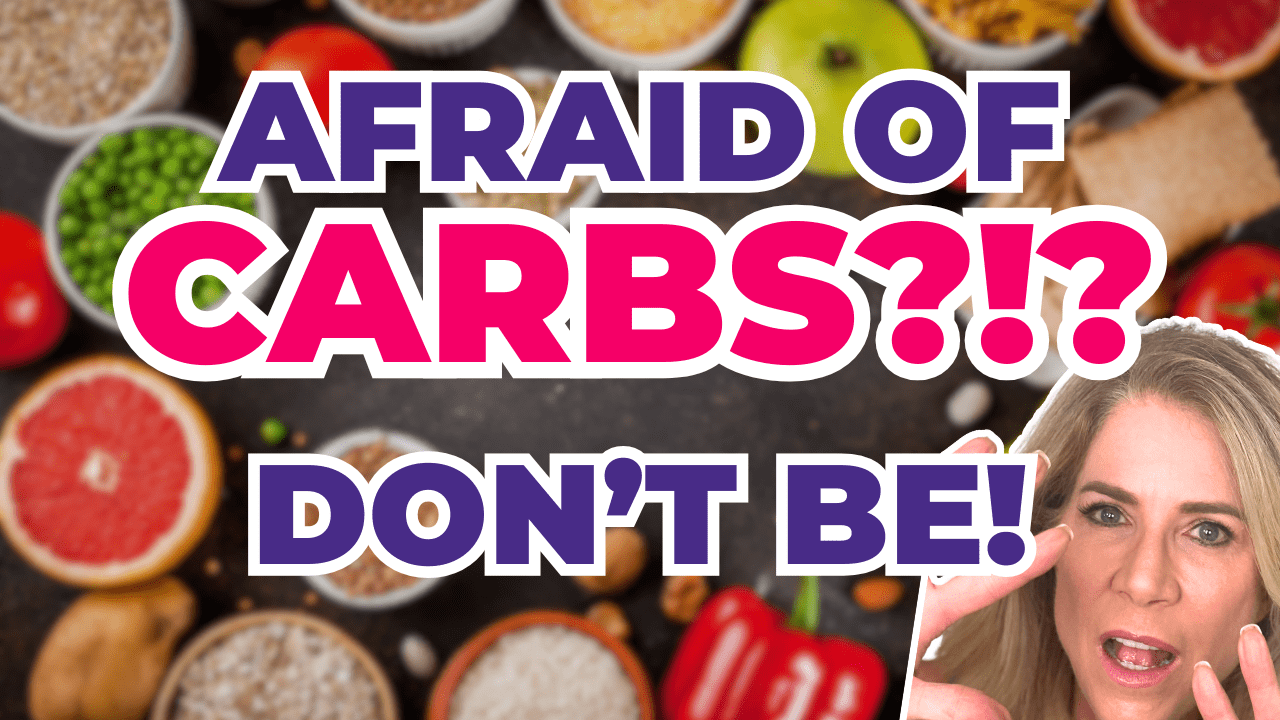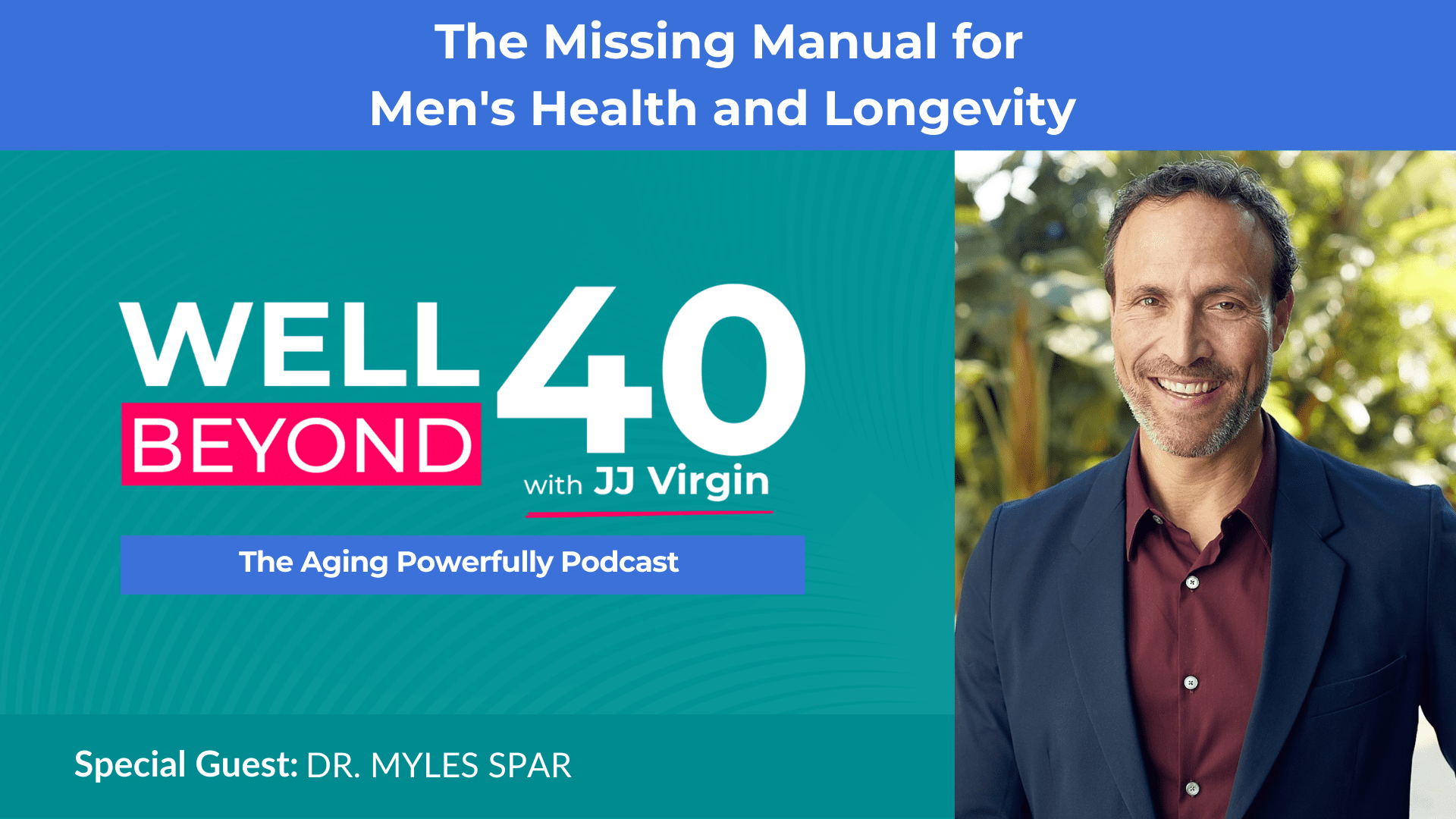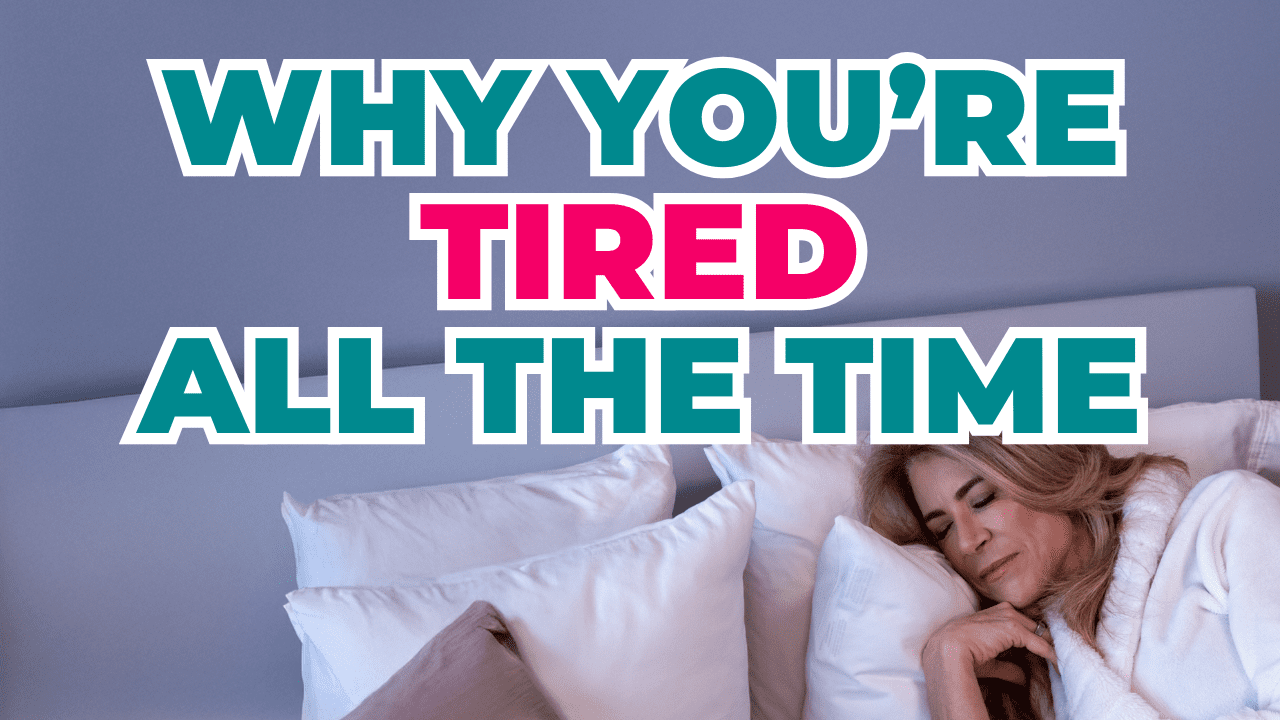Why strategic carbohydrate intake is essential for women’s health in midlife and beyond
I’m busting a major myth today that’s holding back so many women in their quest for health after 60: the idea that carbs are the enemy. While diet dogmas like keto and carnivore have vilified carbohydrates, I’m sharing why strategic carb consumption is actually essential for your metabolism, muscle maintenance, and longevity as you age. The truth is that your body is not just a bank account or chemistry lab—it’s also a history book, and carbs play a crucial role in that story, especially for stressed women, active women, and those struggling with hunger control. Discover why your brain loves carbs, how they support adrenal health, and which nutrient-packed carb sources can actually enhance your muscle strength and energy levels after 60.
What you’ll learn:
- Why the “carbs make you fat” myth is oversimplified and how macronutrient balance actually impacts weight
- How carbs support your exercise recovery by replenishing muscle glycogen stores
- The crucial role carbohydrates play in adrenal health and stress management
- Why your brain needs carbs for optimal function and mood regulation
- The best types of carbs to eat for muscle support and longevity
- How fiber-rich carbs help regulate hunger by influencing GLP-1 and ghrelin
- The ideal ways to incorporate carbs without blood sugar spikes
Love the Podcast? Here’s what to do:
Make My Day & Share Your Thoughts!
- Subscribe to the podcast & leave me a review
- Text a screenshot to 813-565-2627
- Expect a personal reply because your voice is so important to me.
Join 55,000+ followers who make this podcast thrive.
Want to listen to the show completely ad-free?
- Go to subscribetojj.com
- Enjoy the VIP experience for just $4.99/month or $49.99/year (save 17%!)
- Click “TRY FREE” and start your ad-free journey today!
Resources Mentioned in this episode
7-Day Eat Protein First Challenge
Track your protein & macros with Cronometer App
Download my FREE Best Rest Sleep Cheat Sheet
Episode Sponsors:
Try Timeline. Use code JJ10 for 10% off all products
Try Qualia risk free for up to 100 days and code VIRGINWELLNESS for an additional 15% off
I think cutting carbs is the key to staying lean after 60. Well think again. Avoiding carbs might actually be hurting your metabolism, your muscles, and ultimately your longevity. Yep. Let’s bust this myth. Once and for all. All right, let’s look at these things. Low carb, keto carnivore. These diet dogmas would leave you to believe that carbs are evil and the source of all weight gain.
So what’s really the truth here? Do carbs really make you gain weight or is there more to the story? Okay, so if you’re interested in metabolism, muscle, powerful aging, and metabolic health, I am too, and you’re in the right place. This is what I’m kind of obsessed about and I delve into all of these subjects on this channel, so be sure to subscribe so you never miss a video.
Okay, back on over to carbs. First off, is weight gain really caused by carbs alone or is it more about consuming more calories? Then you burn. Now, this might seem like an easy question, but the answer is way more nuanced. There are two conflicting theories about how we gain weight that need to be addressed.
To answer it, you know, I used to say your body isn’t a bank account. It’s a chemistry lab. Now, I’ve revised it a bit and I say that your body is a bank account. It’s also a chemistry lab and it’s a history book. So let me explain this. So first of all, the bank account model, this is the model that says that you gain weight because you ate more than you could burn off, right?
And while this is true, we also know. That the macros you eat, the protein, carbs, and fat and their metabolic effects can impact how easily the surplus occurs. So first of all, let’s look at protein. Protein is two to three times the thermic effect of food. The carbs do, which means that you are gonna burn a lot more calories, eating protein than you do carbs just in the digestion of it.
So if you’re eating carbs, you’re using less calories, digesting it. Compared to protein. Second, we know that ultra processed carbs actually have an even lower thermic response to food thermic effective food, and they also drive hunger. Several studies have shown that those who consume ultra processed foods tend to eat more about 500 calories a day more, which would then create that whole caloric sur place.
Right, and that surplus has to go somewhere. Now on the chemistry lab side, here’s the deal. It’s called the carbohydrate insulin model of obesity. And it says that carbs drive insulin and insulin promote fat storage. And we know that to be true, right? High carb diets with excess calories have been shown to result in higher fat mass gain.
So the first big takeaway for you is that macro balance and the type of carbs you eat matter. And the second one is that too much healthy food. I. Is unhealthy. So again, all of these things matter, but let’s dig back into carbs. Do they have a place in a healthy diet? And what are the benefits that they might have?
And here’s the reality. We have to have protein, we have to have fat, and we have to have water to survive. We can survive without carbs. However, that doesn’t mean it’s the healthiest choice for you. And I’ve found that especially for three groups of women. Stressed out women, women who are athletic, and those who are trying to get control of their hunger, that carbs can be a game changer.
So let’s go into exercise first. When you exercise, carbohydrates are stored as glycogen in two places. Number one, they’re stored in the liver. Right. That’s all the time. But then in our working muscles, that’s why we wanna exercise so that we deplete glycogen stores and then we put more glycogen in these working muscles.
And when we exercise, we access this glycogen. When we use those muscles, especially in higher intensity activity. So having great muscle stores of glycogen sets you up for getting a lot outta your workouts. Now, carbohydrates play in a really important role in adrenal health, primarily because they help regulate blood sugar levels and reduce the physiological stress burden on the adrenal glands.
They also help regulate cortisol release if your blood sugar drops. This triggers a cortisol release, right? So eating fiber, rich carbs can stop that. If you’re eating low carb, your adrenal glands are more involved in all of this blood sugar regulation. They’ve gotta work harder. So carbohydrates can help the adrenals by reducing the demand for cortisol, helping prevent that chronic adrenal stimulation and stress related fatigue.
And finally, the hunger piece of this, and this is where the type of carbs come in. And I like to think of eating carbs. Big time for their fiber. Not only is it great fuel for your microbiome, but it also slows the blood sugar response to the meal and raises da da da GLP one. And by the way, fiber plus protein is the perfect equation for raising GLP one and lowering the hunger hormone Ghrelin.
Which means you slow down stomach emptying and you feel fuller longer. Plus, another cool thing carbs do is they help raise serotonin in the brain and that can help reduce cravings. So while you can live without carbs, it’s not necessarily optimal. Plus they also provide some key nutrients. Polyphenols, antioxidants, different types of fiber and resistant starch.
B vitamins, minerals, and nitrates. I’m gonna talk a little bit more about these, but know this higher antioxidant and nitrate intakes have been associated. This is crazy with increased hand grip strength. Higher fiber intake is also associated with an increase in skeletal muscle. Let’s talk about what happens to a women’s metabolism after 60.
How carbs could potentially help here. Now, you’ve likely heard about the latest research on metabolism and that we age in two big spurts, one around 40 and one at 60, and that after 60 is when we really start to see metabolism slow down. So what’s really going on? Well, here’s the truth. You age because you’re losing muscle.
You don’t lose muscle necessarily because you age. The drop in hormones with menopause is a big contributor here, so you lose both estrogen and testosterone. And these are both anabolic and thyroid can go down too. And you need thyroid to build muscle too. And of course diet is huge. Protein is the big star here, but carbs are helpful too.
I shared earlier about fiber antioxidant nitrates, helping with strength and muscle. What I’ve noticed most is that when I have adequate carbs on board, I get more outta my workouts and I have better energy all throughout the day. And again, this is because I’m refueling those glycogen stores in my muscles.
So I have the energy stores available when I’m working out, and it’s helping me keep my cortisol more balanced and not giving my adrenal glands. Extra work. I mean, after all, they already have extra work. Think about it, when you go through menopause, your adrenal glands now are helping produce estrogen, so we don’t need to push ’em even harder.
Alright, now that we know that carbs aren’t the bad guys, let’s talk about what ones are the best ones to be eating and which are the ones that could really support muscle mass and longevity. And the first thing I wanna give a shout out to are nitrate rich foods, because your body converts these nitrates into nitrate and then into nitric oxide.
And nitric oxide is super good for your heart health. It helps support blood flow. So nitrate rich. Foods are spinach, arugula, or rocket salad, celery, beets, radishes and turnips. Speaking of leafy greens, kale, spinach, chard, charred, uh, beet greens are also awesome because they’re rich in polyphenols that support DNA methylation.
And then other thing I want you to focus on are cruciferous vegetables like broccoli, cauliflower, Brussels sprouts, and every single day, by the way, eat at least one of those ’cause of the sulforaphane that activates NRF two. It’s a longevity pathway. The other thing I want you to focus on are starchy carbs.
Starchy carbs have resistant starch, so things like legumes, lentils, chickpeas, black beans, barely rip bananas, and cooled potatoes, cooled rice have resistant starch. Name this. Because it resists digestion and helps raise butyrate, and butyrate helps support fat burning. Other one I want you to do, I know this is gonna be hard, but eat some berries.
I eat berries every day, blueberries, blackberries, raspberries about a cup or two every day they have anthocyanins that help reduce oxidative stress. You will notice though, that I didn’t say, Hey, have some fruit juice, have some dried fruit, have some flour. I’m really getting to as close to nature as possible here.
When we talk about eating carbohydrates and moving away from the ultra processed foods, first of all, we know that these ultra processed foods can be pro-inflammatory. They can lower muscle protein synthesis ’cause inflammation, kind of blocks muscle protein synthesis. But the other, um, thing here is they can drive more hunger and they have a lower thermic effect of.
Food. They can also cause insulin resistance, which of course, that also impairs muscle protein synthesis and accelerates aging. The other thing to notice here is that I had a big variety of different types of plants and colors of plants, because I want you to get a lot of different polyphenols, a lot of different fibers, so you’ll get really good gut microbiome diversity.
There was a project, it’s called the American Gut Project, where they found that. Optimally eating about 30 different types of plants. Herbs count, by the way, thankfully, uh, a week is what you really wanna do for the best gut microbiome diversity. If you’re still with me here, hopefully you’re leaning away from that fear of carbs a bit more.
Now, I know, especially for us women, they actually do more good for us than we might have thought before. So I want you to make sure you stay with me to the end, because I’m gonna have another video that I wanna share with you, and I’m gonna share that. Best way to incorporate carbs without spiking blood sugar or causing weight gain.
So let’s talk about how avoiding carbs might impact energy levels, your brain function, and your overall health. Now here’s the deal. Your brain is a carb lover. It requires about a hundred to 130 grams of carbohydrates a day to really function optimally. Why? Because glucose, which comes from carbs, is the brain’s preferred fuel source, and neurons demand twice as much energy as the other cells in your body.
So carbs are essential for mental clarity and focus when you cut carbs dramatically. Your body will either need to start using ketones or it will need to convert protein into glucose. This is not an efficient process though, and that’s why you can hear, you’ve heard about it like the keto flu. You might feel drained, you might feel foggy, might zap your energy and make.
Just simple things that you can normally do like hard to focus on. Could avoiding carbs lead to this brain fog, the fatigue and poor cognitive function? And again, if you’ve ever felt foggy or forgetful on a low carb diet, your body, your brain needs time to make a shift. Your brain can run on ketones, but it needs time to do that.
And so what you’re feeling is your brain not getting what it needs. Also, remember, low carb diets can disrupt serotonin production and serotonin. Is that feel good neurotransmitter. That regulates mood and focus. So without enough carbs, your brain struggles to produce serotonin efficiently. It can make you irritable more tired, and just kind of have crappy cognitive function.
This is especially true for women. Over 40 hormonal shifts during this time make the brain more sensitive to energy fluctuation. So. Cutting carbs just basically amplifies those symptoms of brain fog and fatigue. Let’s look at low carb diets and how do they impact stress hormones like cortisol, and what effects does this have Then on hormonal balance.
Now, I spoke earlier about how low carb diets often increase cortisol, and you know, cortisol, it’s the stress hormone produced by the adrenal glands, and especially this can happen in the short term and elevated cortisol then disrupts thyroid function. And causes lower T three, active T three hormone levels, which are hugely important for your metabolism, for your energy, and for your ability to build muscle if you’re cycling.
Cutting carbs too much can lead to irregular menstrual cycles or even amenorrhea because here’s the reality, reproduction is non-essential. If you don’t have enough of fuel, your body goes. Uh oh. We need to, we need to stop that. So if you’re feeling like you’re off balance hormonally, you may just need to incorporate more carbs into your diet.
So let’s talk about the best way to incorporate carbs without getting blood sugar spikes or causing any kind of. Weight gain. First off, how much should you have? And I think this is where we’ve all gotta be our own end of one and really play around with where you feel best. 130 grams is a good baseline, but I find that I do fine around a hundred grams.
Um, if I’m really active, I push it a little bit more. My carbohydrates first come from non-surgery vegetables. Then two to three fruit servings, berries, usually. Then I start to move into a little bit of starchy, and I really like legumes here, and I’ve been doing a lot of purple potatoes cooled down. You really wanna stick as close to nature here as possible, like stay away from the refined carbs, and here I want you to also focus on quality over quantity.
Now I scrub my carbs throughout the day. I generally go a little bit lower in the morning. I refuel after the gym. That’s when I want to get them into my Glycan stores. And then I find that I do better if I have a little bit at night. It helps me sleep better. So my plate is always eat protein first. Add in the carbs and a little bit of fat ’cause that’s gonna gimme that great satiety blood sugar balance.
And also remember when you put the protein and the fiber together, you’ve got that GLP one natural release. I promised I would have another video here that I know that you’re gonna enjoy, and I’ve also included some helpful links in the description to help you get started. So be sure to check those out and hit the notification bell so you do not miss the next video.

 Subscribe to our show
Subscribe to our show 



